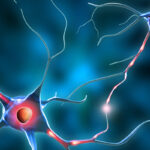A research article published in Nature Communications highlights the crucial role the cerebellum plays in sensorimotor and associative learning.
According to researchers at the University of Colorado Anschutz Medical Campus, a region of the cerebellum they studied on rodents is implicated in split-second decision making.
For the study, researchers turned to the molecular layer interneurons (MLIs) located in the cerebellum.
“We used two-photon microscopy to study the role of ensembles of cerebellar MLIs in a go-no go task where mice obtain a sugar water reward if they lick a spout in the presence of the rewarded odorant and avoid a timeout when they refrain from licking for the unrewarded odorant,” the co-authors stated in the findings.
With learning, the reward odor led to a substantial increase in MLI calcium responses, however, when the stimuli were reversed, the MLI flipped responses to the odors.
“Mice took a longer time to refrain from licking in the presence of the unrewarded odorant and had difficulty becoming proficient when MLIs were inhibited by chemogenetic intervention,” the co-authors explained in their article.
“Our findings support a role for MLIs in learning valence in the cerebellum.”


